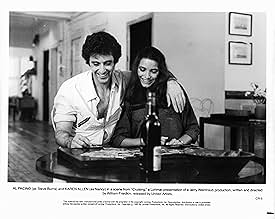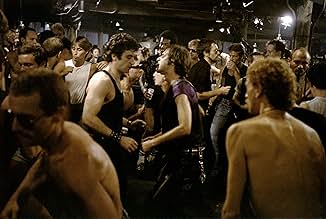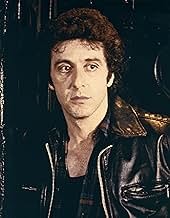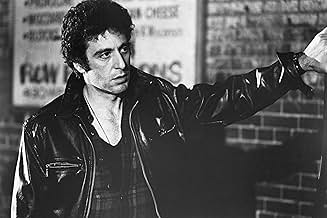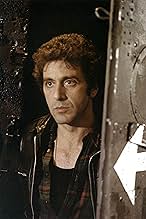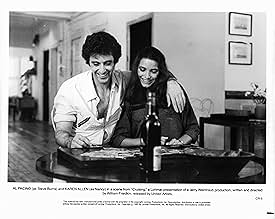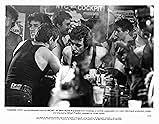Un inspecteur de police s'infiltre dans la sous-culture homosexuelle S&M de New York pour attraper un tueur en série qui s'attaque aux homosexuels.Un inspecteur de police s'infiltre dans la sous-culture homosexuelle S&M de New York pour attraper un tueur en série qui s'attaque aux homosexuels.Un inspecteur de police s'infiltre dans la sous-culture homosexuelle S&M de New York pour attraper un tueur en série qui s'attaque aux homosexuels.
- Réalisation
- Scénario
- Casting principal
- Récompenses
- 5 nominations au total
Ed O'Neill
- Det. Schreiber
- (as Edward O'Neil)
Avis à la une
When body parts of men start showing up in the Hudson River, police come to believe a serial killer is targeting gay men. Under intense pressure from the media, gay advocacy groups, the city's elected officials, Steve Burns (Al Pacino) is assigned to go undercover in the fringe S&M gay scene as he has a similar profile and build to the men being killed. As Steve adopts the alias of John Forbes, he finds himself further and further entrenched and drawn to the lurid allure of the scene.
Based on the 1970 novel Cruising by Gerald Walker, French Connection producer Philip D'Antoni had approached Friedkin earlier in his career only for Friedkin to turn it down due to lack of interest. D'Antoni then approached Steven Spielberg, but was unable to find studio backing. When the rights were bought by Jerry Weintraub years later, Friedkin had warmed up to the idea thanks to his exposure to a series of articles by Village Voice writer Arthur Bell as well as encounters with former police officer Randy Jurgensen who had done similar deep cover work to investigate a series of gay murders. Not only was the film prone to frequent conflicts with the MPAA to secure an R rating with nearly 40 minutes of deleted footage of explicit material in the various bars, but the film was also subject to massive protests and pickets from gay rights groups who characterized the film as homophobic and anti-gay. In the years since it's troubled release the film continues to be discussed and has found appreciation among directors such as the Safdie brothers, Nicholas Winding Refn, and Quentin Tarantino.
The movie is very giallo like with its lurid sexualized murders which are investigated in a way where the film is more concerned with crafting an atmosphere and sense of character as Friedkin captures the seamy side of New York's nightlife. While Al Pacino does well playing the audience proxy as he reacts to the world crafted by Friedkin's film, there is a sense that Pacino is a bit more secured in his sexuality than the filmmakers intended. As an experience the film is simply unforgettable.
William Friedkin's Cruising is a tense and thrilling film that captures its lurid atmosphere so vividly you can feel it with every scene. While the movie's loose structure and ambiguous payoffs will challenge viewers, in terms of craft of filmmaking Cruising has few equals.
Based on the 1970 novel Cruising by Gerald Walker, French Connection producer Philip D'Antoni had approached Friedkin earlier in his career only for Friedkin to turn it down due to lack of interest. D'Antoni then approached Steven Spielberg, but was unable to find studio backing. When the rights were bought by Jerry Weintraub years later, Friedkin had warmed up to the idea thanks to his exposure to a series of articles by Village Voice writer Arthur Bell as well as encounters with former police officer Randy Jurgensen who had done similar deep cover work to investigate a series of gay murders. Not only was the film prone to frequent conflicts with the MPAA to secure an R rating with nearly 40 minutes of deleted footage of explicit material in the various bars, but the film was also subject to massive protests and pickets from gay rights groups who characterized the film as homophobic and anti-gay. In the years since it's troubled release the film continues to be discussed and has found appreciation among directors such as the Safdie brothers, Nicholas Winding Refn, and Quentin Tarantino.
The movie is very giallo like with its lurid sexualized murders which are investigated in a way where the film is more concerned with crafting an atmosphere and sense of character as Friedkin captures the seamy side of New York's nightlife. While Al Pacino does well playing the audience proxy as he reacts to the world crafted by Friedkin's film, there is a sense that Pacino is a bit more secured in his sexuality than the filmmakers intended. As an experience the film is simply unforgettable.
William Friedkin's Cruising is a tense and thrilling film that captures its lurid atmosphere so vividly you can feel it with every scene. While the movie's loose structure and ambiguous payoffs will challenge viewers, in terms of craft of filmmaking Cruising has few equals.
What strikes me while watching the film, is that truth to reality is really refreshing. No editing in the world can make up to a camera catching a dark, rainy street as they could back in those days when equipment was not developed. Aristoleles claimed that cruelty should be committed outside the scene, that is, in the background. The imagination of the spectator is far more imaginative than a view of the actual event. Therefore, leaving out is stronger in terms of storytelling than showing. Quite the contrary to contemporary movies, I'd say. The advantage of this story is thus the suspense built up on lack of knowledge. There is no flirting with the audience; you do not know in advance who dunnit. There is no flirting with the audience on the task of staging one of the protagonists as a gay either. This is not the greatest movie, but really worth seeing.
I do well remember all the outrage when word about Cruising being filmed on location in the streets of New York with all kinds of protesters from the GLBT community picketing the set. Word had gotten out that the film was going to be about the Leather/S&M scene and everyone that I knew was upset.
Viewed 26 years later Cruising is mild stuff compared to some of what is shown on television today. There isn't a prime time TV series that today doesn't have some gay themed episode on it during its season. Some are sensitive and some are far more crassly exploitive than Cruising could ever aspire to be.
The fuss back then was that in many places including the location of the film, New York City, gay civil rights was not on the statute books. A whole lot of people were trying to make that happen and a film like Cruising was feared in that it would give homophobes a lot of ammunition against the proposed civil rights law.
People needn't have worried. The cause and the community proved a lot stronger than the impact of one film at the box office.
Without all the politics involved, Cruising is a murder mystery. There's a troubled young man with a whole lot of issues murdering and dismembering men he picks up in various locales in New York. Chief of Detectives Paul Sorvino picks officer Al Pacino because in looks and build he fits the physical profile of the victims. Cruising is the story of Pacino's undercover investigation looking for that killer. It also is a story of Pacino reexamining a whole lot of preconceived notions about human sexuality in general.
As it turns out I happen to know one of the cast members of the film who had a small three line speaking role in the film and with Al Pacino himself. He related to me that when the casting call came out, he came in the required leather uniform and had three levels of audition. First with the casting director, then with Bill Friedkin and finally with Al Pacino himself.
What he also mentioned was that Pacino was a nice down to earth sort of fellow when he met him and easy to work with. And the reason he was easy to work with was that he was a man totally focused on the job at hand when on the set.
He also related to me that apparently Bill Friedkin had decided in advance to do some kind of a gay related story. The final script for Cruising beat out others including one that would have had a prostitution angle in it. Probably a worse image for a film than what Cruising was about. This writer whose script was rejected was a political activist as well and he was the one who got the ball rolling with all the protests.
My friend mentioned that among his own group of friends he lost only one permanently over his decision to work in the film. Everyone else in his circle saw the film and their reactions were a gamut of applause for the film to a total trashing. But only one individual broke with him over it.
Art sometimes predicts life. There is a shot during Al Pacino's travels through the bars and clubs of the West Village of 1980 of the Ramrod bar. After Cruising had come and gone from theaters, a man named Ronald Crumpley one November night in 1980 drove by with an Uzi and wounded six and killed two people. Things like that are still happening, even in some of the gay friendliest areas in the USA.
Besides Pacino and Sorvino, the performances to look for are those of Don Scardino as the young writer who lives next door to the apartment Pacino is located in during his undercover assignment and James Remar as Scardino's roommate who is a dancer. They have a volatile relationship and Scardino would be considered a battered spouse had they been able to marry. A story all to true, but hardly limited to same sex relationships.
Cruising will never rank in the top 10 of Al Pacino's films on anybody's list. But sufficient time has passed so that we can look at it with a bit more objectivity than was possible in 1980.
Viewed 26 years later Cruising is mild stuff compared to some of what is shown on television today. There isn't a prime time TV series that today doesn't have some gay themed episode on it during its season. Some are sensitive and some are far more crassly exploitive than Cruising could ever aspire to be.
The fuss back then was that in many places including the location of the film, New York City, gay civil rights was not on the statute books. A whole lot of people were trying to make that happen and a film like Cruising was feared in that it would give homophobes a lot of ammunition against the proposed civil rights law.
People needn't have worried. The cause and the community proved a lot stronger than the impact of one film at the box office.
Without all the politics involved, Cruising is a murder mystery. There's a troubled young man with a whole lot of issues murdering and dismembering men he picks up in various locales in New York. Chief of Detectives Paul Sorvino picks officer Al Pacino because in looks and build he fits the physical profile of the victims. Cruising is the story of Pacino's undercover investigation looking for that killer. It also is a story of Pacino reexamining a whole lot of preconceived notions about human sexuality in general.
As it turns out I happen to know one of the cast members of the film who had a small three line speaking role in the film and with Al Pacino himself. He related to me that when the casting call came out, he came in the required leather uniform and had three levels of audition. First with the casting director, then with Bill Friedkin and finally with Al Pacino himself.
What he also mentioned was that Pacino was a nice down to earth sort of fellow when he met him and easy to work with. And the reason he was easy to work with was that he was a man totally focused on the job at hand when on the set.
He also related to me that apparently Bill Friedkin had decided in advance to do some kind of a gay related story. The final script for Cruising beat out others including one that would have had a prostitution angle in it. Probably a worse image for a film than what Cruising was about. This writer whose script was rejected was a political activist as well and he was the one who got the ball rolling with all the protests.
My friend mentioned that among his own group of friends he lost only one permanently over his decision to work in the film. Everyone else in his circle saw the film and their reactions were a gamut of applause for the film to a total trashing. But only one individual broke with him over it.
Art sometimes predicts life. There is a shot during Al Pacino's travels through the bars and clubs of the West Village of 1980 of the Ramrod bar. After Cruising had come and gone from theaters, a man named Ronald Crumpley one November night in 1980 drove by with an Uzi and wounded six and killed two people. Things like that are still happening, even in some of the gay friendliest areas in the USA.
Besides Pacino and Sorvino, the performances to look for are those of Don Scardino as the young writer who lives next door to the apartment Pacino is located in during his undercover assignment and James Remar as Scardino's roommate who is a dancer. They have a volatile relationship and Scardino would be considered a battered spouse had they been able to marry. A story all to true, but hardly limited to same sex relationships.
Cruising will never rank in the top 10 of Al Pacino's films on anybody's list. But sufficient time has passed so that we can look at it with a bit more objectivity than was possible in 1980.
In New York, the ambitious police officer Steve Burns (Al Pacino) is assigned by his Captain Edelson (Paul Sorvino) to work uncover in the gay S&M underworld to seek out the serial-killer that is killing and severing the members of gays since he has the same appearance of the victims. Steve has the objective to be promoted to detective and get his golden shield and Capt. Edelson is the only one in the department who knows Steve's assignment.
Steve does not tell to his girlfriend Nancy (Karen Allen) his mission and he needs to learn the behavior of this community. During the investigation, Steve is affected by the discoveries in this new world, but Captain Edelson does not want him to quit his assignment.
In the 70's and 80's, Al Pacino was among my favorite American actors with his magnificent performances. "Cruising" is an original movie that discloses part of the society unknown to straight persons like me: the gay S&M world of New York in the late 70's.
I have seen this film at least four time and today for the first time on DVD, and my greatest question is how far a person would go to be promoted. Steve Burns dreams on having a golden shield and when he has his chance, he accepts a dangerous psychological mission to find the serial-killer that is killing gays and affects his personal life and his relationship with his girlfriend. The conclusion is one of the most ambiguous that I have ever seen in an American movie, when Steve looks at his image on the mirror. My vote is eight.
Title (Brazil): "Parceiros da Noite" ("Night Partners")
Steve does not tell to his girlfriend Nancy (Karen Allen) his mission and he needs to learn the behavior of this community. During the investigation, Steve is affected by the discoveries in this new world, but Captain Edelson does not want him to quit his assignment.
In the 70's and 80's, Al Pacino was among my favorite American actors with his magnificent performances. "Cruising" is an original movie that discloses part of the society unknown to straight persons like me: the gay S&M world of New York in the late 70's.
I have seen this film at least four time and today for the first time on DVD, and my greatest question is how far a person would go to be promoted. Steve Burns dreams on having a golden shield and when he has his chance, he accepts a dangerous psychological mission to find the serial-killer that is killing gays and affects his personal life and his relationship with his girlfriend. The conclusion is one of the most ambiguous that I have ever seen in an American movie, when Steve looks at his image on the mirror. My vote is eight.
Title (Brazil): "Parceiros da Noite" ("Night Partners")
William Friedkin is a mysterious, often mystifying film-maker. Although he rose to prominence at the same time as the rest of the so-called 'movie brat' generation of directors (Coppola, Spielberg, Scorsese, DePalma, et al.), he stands apart, even from a group as essentially disparate as this one. For one thing, his films lack the intertextual references and cinematic stylisation common to most of the other members. If he has an over-riding aesthetic, it would be the ugliness of the majority of human existence. He's not interested in prettifying his images or indulging in style-for-style's sake; which is not to say that his film's don't exhibit inventive and effective technique, just that this technique is always at the service of the story he's telling, and is often blunt and brutally effective in it's employment. All of this no doubt arises from his start in documentary film-making. Friedkin is particularly good at depicting the menace of urban environments, and the locales of a lot of his films are frightening, tangibly real places. Witness the sequences involving Karras' aged mother in 'The Exorcist', which for me are the most disturbing scenes in an often terrifying film. As we observe the elderly lady living alone in her shabby apartment in a crime-ridden neighbourhood, we realise that this is the existence that many millions of people are forced to endure, and it's oppressiveness adds immeasurably to the psychological impact of the film as a whole. We share Karras' fear and traumatising guilt that she died alone in such circumstances, and the special effects trickery of the climax is lent a genuine resonance.
Because of the stark, seemingly 'artless' force and apparent misanthropy of much of his work, a number of otherwise perceptive commentators dislike Friedkin intensely. Pauline Kael was extremely cool about 'The French Connection' and absolutely hated 'The Exorcist'. David Thompson described him as "essentially incompetent", bludgeoning the audience with blatant and obvious effects. In fact, Friedkin's best work is highly sophisticated in it's use of sound and music, and employs often visceral imagery to telling and subversive effect. However, some of his films ARE genuinely bloody awful, or at least depressingly mediocre. The very inconsistency of his work lies at the centre of the mystery that is his career. He seems to me to be a fiercely intelligent man whose art is driven by his life rather than the culture of film, and whose reportedly quixotic, often self-destructive personality in no small measure accounts for the expansive peaks and troughs of his cinematic achievements.
Friedkin has reassuring or comforting his audience way down the list of his priorities. In the case of 'Cruising', he neglected to add them at all. Because of this, 'Cruising' is a very difficult film to watch. Most film-makers, were they making a film set in such an alien and frightening environment, would go overboard on providing us with at least one protagonist we could identify with. But Friedkin takes the very opposite route and presents us entirely with characters who are abhorrent, sleazy or totally ambiguous. Indeed, ambiguity is the film's raison d'etre - we are never sure of anything, and this becomes both the pictures great strength and source of much audience frustration. It seems that unlike, say, Spielberg, who continually seeks the approbation of his audience, Friedkin actively resents his (or rather, their preconceptions and certainties), leading him to consistently challenge and upset them. This can be exciting to those who value such seditious manouveres, but dispiriting and destabilising for those that don't.
The major problem with evaluating 'Cruising' is that the film as it currently exists is seriously incomplete (apparently having been shorn of some 40 minutes of footage by the censors!). I suspect that a 'directors cut' should it ever emerge, although no doubt clarifying certain issues, would overall fail to dispel the central ambiguity that is so infuriating and troubling to the majority of the audience, and that lies at the heart of Friedkins vision. "What interests me is the very thin line between good and evil", the director once said when asked to provide a thematic overview of his work - and this is the core of 'Cruising'.
I would urge you to watch the film. It is a uniquely dark, brave piece somewhat compromised by well documented production difficulties and the censors scissors. It has a sinister, compelling momentum and wonderfully ugly, grainy textures that seep into your pores leaving you uncomfortable and unsettled. Sometimes a feel-bad movie can be as bracing as a winter morning. 'Cruising' is such an experience, and a fascinating, provocative one at that.
Because of the stark, seemingly 'artless' force and apparent misanthropy of much of his work, a number of otherwise perceptive commentators dislike Friedkin intensely. Pauline Kael was extremely cool about 'The French Connection' and absolutely hated 'The Exorcist'. David Thompson described him as "essentially incompetent", bludgeoning the audience with blatant and obvious effects. In fact, Friedkin's best work is highly sophisticated in it's use of sound and music, and employs often visceral imagery to telling and subversive effect. However, some of his films ARE genuinely bloody awful, or at least depressingly mediocre. The very inconsistency of his work lies at the centre of the mystery that is his career. He seems to me to be a fiercely intelligent man whose art is driven by his life rather than the culture of film, and whose reportedly quixotic, often self-destructive personality in no small measure accounts for the expansive peaks and troughs of his cinematic achievements.
Friedkin has reassuring or comforting his audience way down the list of his priorities. In the case of 'Cruising', he neglected to add them at all. Because of this, 'Cruising' is a very difficult film to watch. Most film-makers, were they making a film set in such an alien and frightening environment, would go overboard on providing us with at least one protagonist we could identify with. But Friedkin takes the very opposite route and presents us entirely with characters who are abhorrent, sleazy or totally ambiguous. Indeed, ambiguity is the film's raison d'etre - we are never sure of anything, and this becomes both the pictures great strength and source of much audience frustration. It seems that unlike, say, Spielberg, who continually seeks the approbation of his audience, Friedkin actively resents his (or rather, their preconceptions and certainties), leading him to consistently challenge and upset them. This can be exciting to those who value such seditious manouveres, but dispiriting and destabilising for those that don't.
The major problem with evaluating 'Cruising' is that the film as it currently exists is seriously incomplete (apparently having been shorn of some 40 minutes of footage by the censors!). I suspect that a 'directors cut' should it ever emerge, although no doubt clarifying certain issues, would overall fail to dispel the central ambiguity that is so infuriating and troubling to the majority of the audience, and that lies at the heart of Friedkins vision. "What interests me is the very thin line between good and evil", the director once said when asked to provide a thematic overview of his work - and this is the core of 'Cruising'.
I would urge you to watch the film. It is a uniquely dark, brave piece somewhat compromised by well documented production difficulties and the censors scissors. It has a sinister, compelling momentum and wonderfully ugly, grainy textures that seep into your pores leaving you uncomfortable and unsettled. Sometimes a feel-bad movie can be as bracing as a winter morning. 'Cruising' is such an experience, and a fascinating, provocative one at that.
Le saviez-vous
- AnecdotesTwo of the notorious gay bars featured in the film - Mine Shaft and Eagle's Nest - eventually barred William Friedkin.
- GaffesWhen the first victim gets stabbed blood is shown running off his shoulder but the knife is spotless.
- Citations
Steve Burns: Hips or lips?
- Crédits fousThe film only opens with the title in large letters, across the screen. It is only at the end where the filmmakers are credited.
- Versions alternativesUK cinema and 1987 video versions were cut by 54 secs by the BBFC. The 1997 Maverick Directors video release was cut by 39 seconds to remove subliminal shots of anal sex during the murder scenes (one of which appears in the film though heavily darkened) and to edit a pan shot of a gay bar interior and shots of a knife being traced over a bound victims body. Although the uncut version was shown by Sky TV the film was resubmitted to the BBFC in 2003 for a FilmFour showing and many cuts were restored apart from a 1 sec edit to remove the subliminal shots. For the initial release on UK DVD in 2008 all the cuts were waived.
- Bandes originalesThree-Day Moon
Performed by Barre Phillips
Meilleurs choix
Connectez-vous pour évaluer et suivre la liste de favoris afin de recevoir des recommandations personnalisées
- How long is Cruising?Alimenté par Alexa
Détails
- Date de sortie
- Pays d’origine
- Langue
- Aussi connu sous le nom de
- Encrucijadas
- Lieux de tournage
- Sociétés de production
- Voir plus de crédits d'entreprise sur IMDbPro
Box-office
- Budget
- 11 000 000 $US (estimé)
- Montant brut aux États-Unis et au Canada
- 19 798 718 $US
- Montant brut mondial
- 19 815 314 $US
Contribuer à cette page
Suggérer une modification ou ajouter du contenu manquant

Lacune principale
What is the streaming release date of Cruising - La Chasse (1980) in Canada?
Répondre

